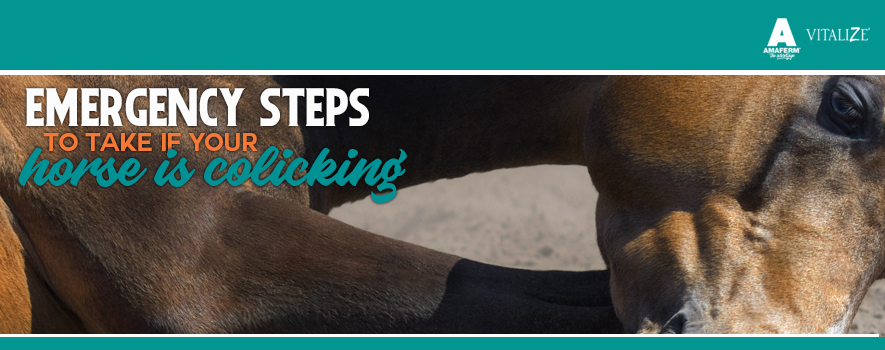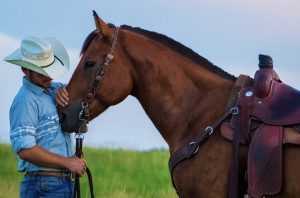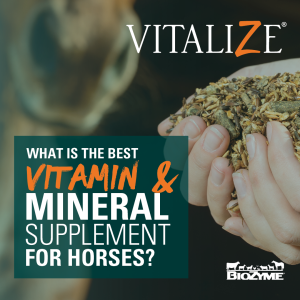
According to the American Association of Equine Practitioners (AAEP), for every 100 horses, there will be 4.2 colic episodes each year. From these incidents, 1.2% will be surgical, and 11% will be fatal. That’s right, 11% will lead to death. What does this mean to you, the horse owner? Colic is not something to be taken lightly. If you are unsure how to spot signs of colic, take a look at our complete guide to equine colic.
Once you have determined that your horse is colicking, here are some important steps to take to care for your horse:
1. Keep Calm
While colic is certainly scary, it is important to remain calm and collected if you identify you have a colicking horse. Horses can read you like a book, so if you panic, they panic, which can exacerbate the situation further. You also need to make rational decisions, since time is valuable in these situations.
2. Remove Hay or Grain
If your horse is backed up internally, the last thing you want to do is add more food into his or her system. Most horses will not eat when they are colicking, however, it is still a good idea to remove all hay or grain.
3. Administer Vitalize® Equine Gel
While it is no substitute for veterinary advice or treatment, Vitalize® Equine Gel has been known to turn horses around from mild colic symptoms. It contains the precision-based prebiotic Amaferm®, which is research-proven to increase digestibility by 17%, MOS to sequester pathogens, and a combination of anti-oxidants, vitamins and minerals known to be depleted during times of stress. Customer Lauri Sepelack Wright had a recent colic scare and shared with us:
“I’ve always used the Recovery Paste (transitioned to Vitalize® Equine Gel July 2019) as a prevention, well today I used it as a need. This afternoon my horse was showing signs of a stomach ache, didn’t want his stomach touched, pawing and kicking forward. So, I administered the paste and within 15 minutes he had good loud gut sounds.”
4. Take Vital Signs and Assess the Situation
When you contact your vet, one of the first things he or she will ask is a general overview of your horse, which can easily be attained by collecting vital signs and other symptoms. This information can help your veterinarian identify how serious the colic incident is, or whether it is something else entirely.
- Heart Rate
- Normally 32 to 40 bpm
- Heart rate can be taken through a stethoscope or by pulse, most easily found on the big blood vessels along the jaw.
- Rectal Body Temperature
- Normally 97 to 101° F
- Capillary Refill Time
- The gums should be pink and after pressing on them they should return to normal coloration after only two seconds.
- Gut sounds
- Audible gut sounds in the horse’s gut are normal.
- Manure excreted
- Whether or not manure has been excreted can provide hints to the type and severity of colic.
- Hydration levels (if applicable)
- This can be difficult to know if you have automatic waterers, but if you hang buckets, you will be able to track how much water your horse has consumed.
- Symptoms of colic being shown
- Specific symptoms can indicate certain types of colic [link to article], so identifying which signs your horse is exhibiting will help your vet understand the situation further.
- Changes in Routine
- Feed, exercise, management, show, etc.
5. Contact Your Vet
After collecting the general overview of your horse, contact your vet and let him or her know what is going on. The vet may give you simple instructions, come out for a consultation, or—if serious enough—request that you trailer to the nearest equine hospital for possible surgery. It is important to not give any medication, specifically phenylbutazone or Banamine, to your horse in this situation because they can mask pain and prevent your vet from diagnosing your horse properly. Once you speak with your vet, he or she could instruct you to administer a medication.
While we hope you never have to take these emergency steps, it is critical to know what to do should the time come. Horses are unpredictable so we must always have a plan in mind and strategize for our horse’s digestive health before disaster happens. Vitalize digestive health supplements contain Amaferm, a precision-based prebiotic, which increases digestion and helps to prevent digestive upset. More digestion equals less colic. For everything you need to know to win the game against colic, check out last week’s blog: A Complete Guide to Equine Colic.

